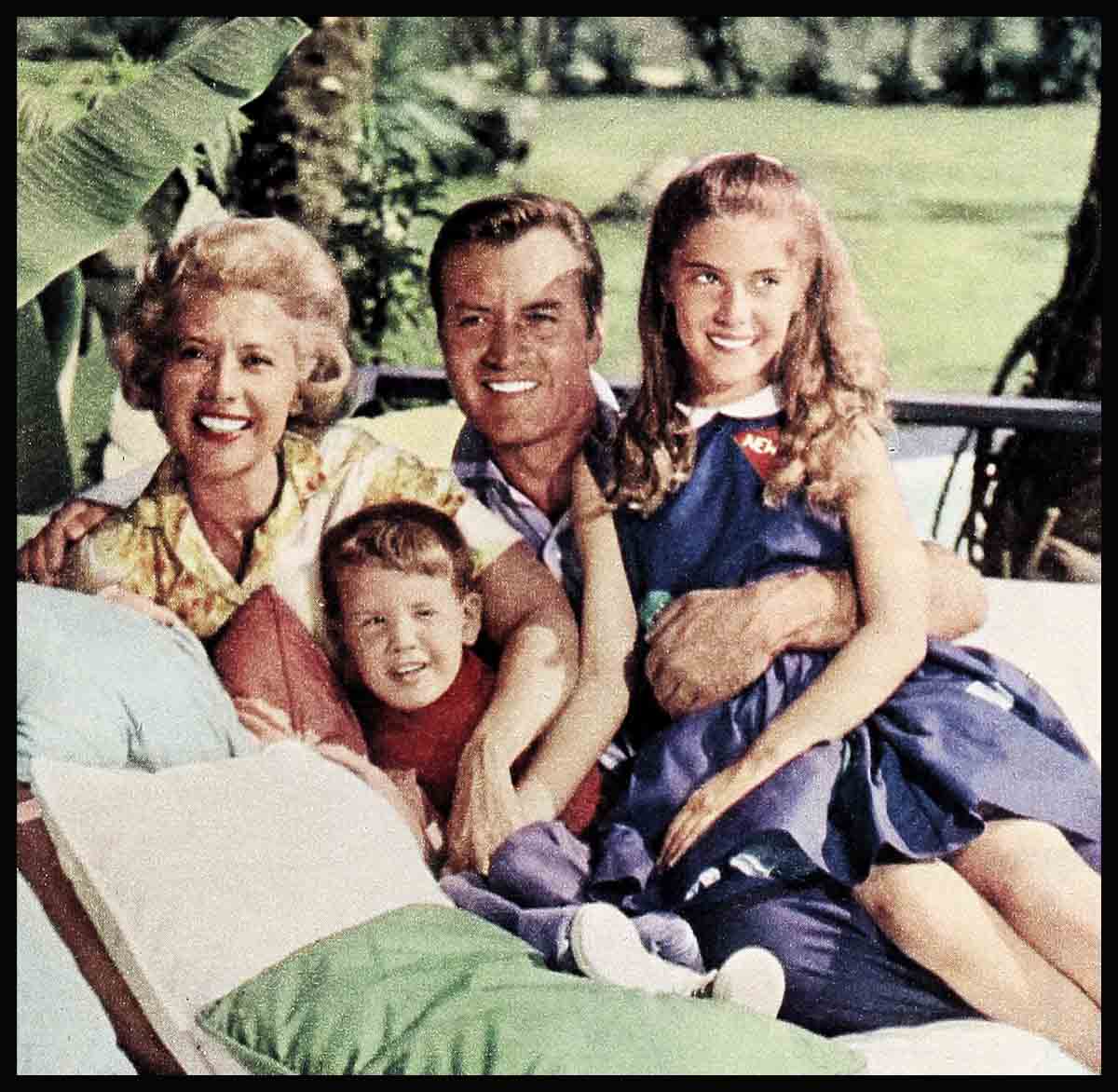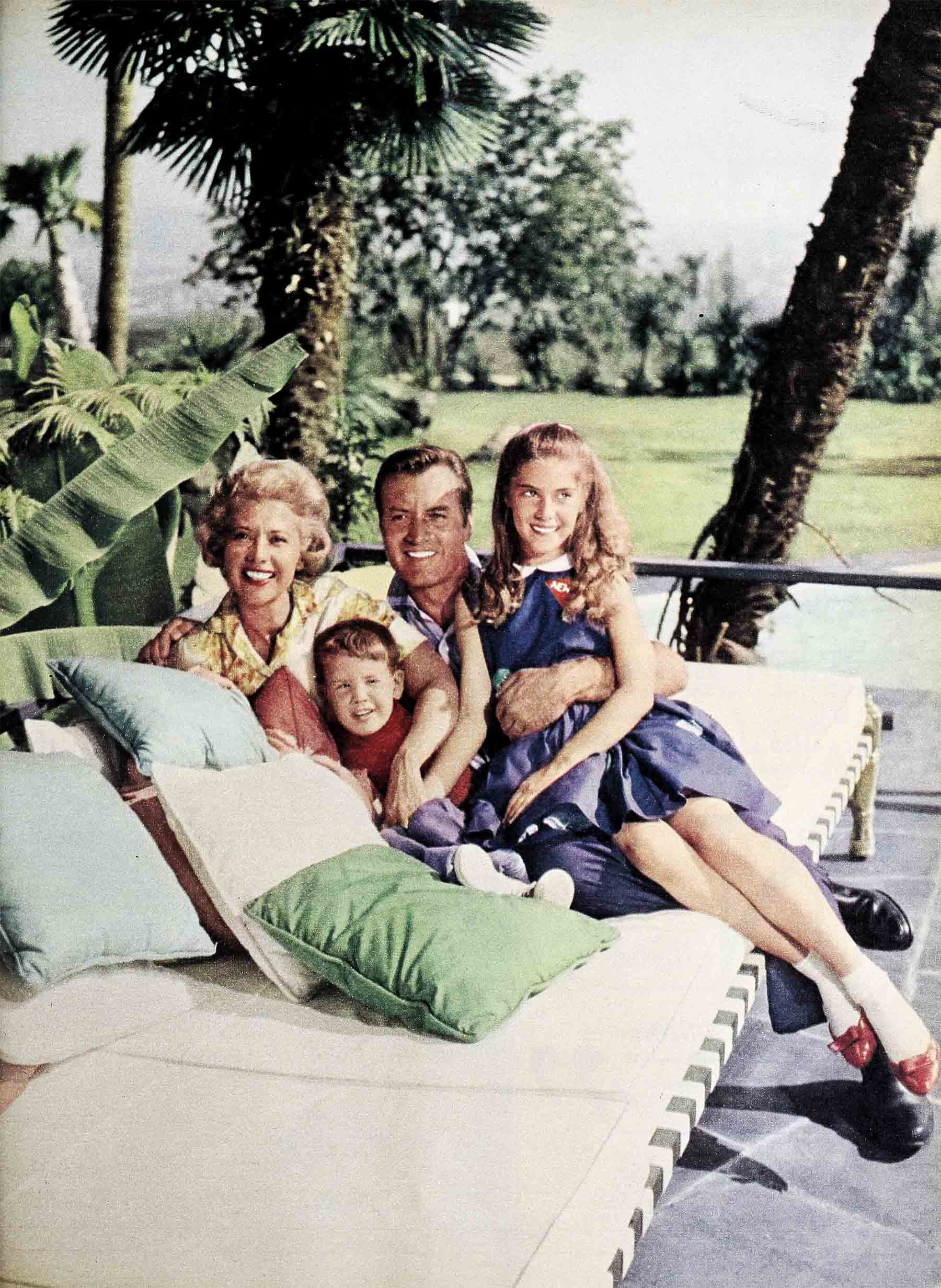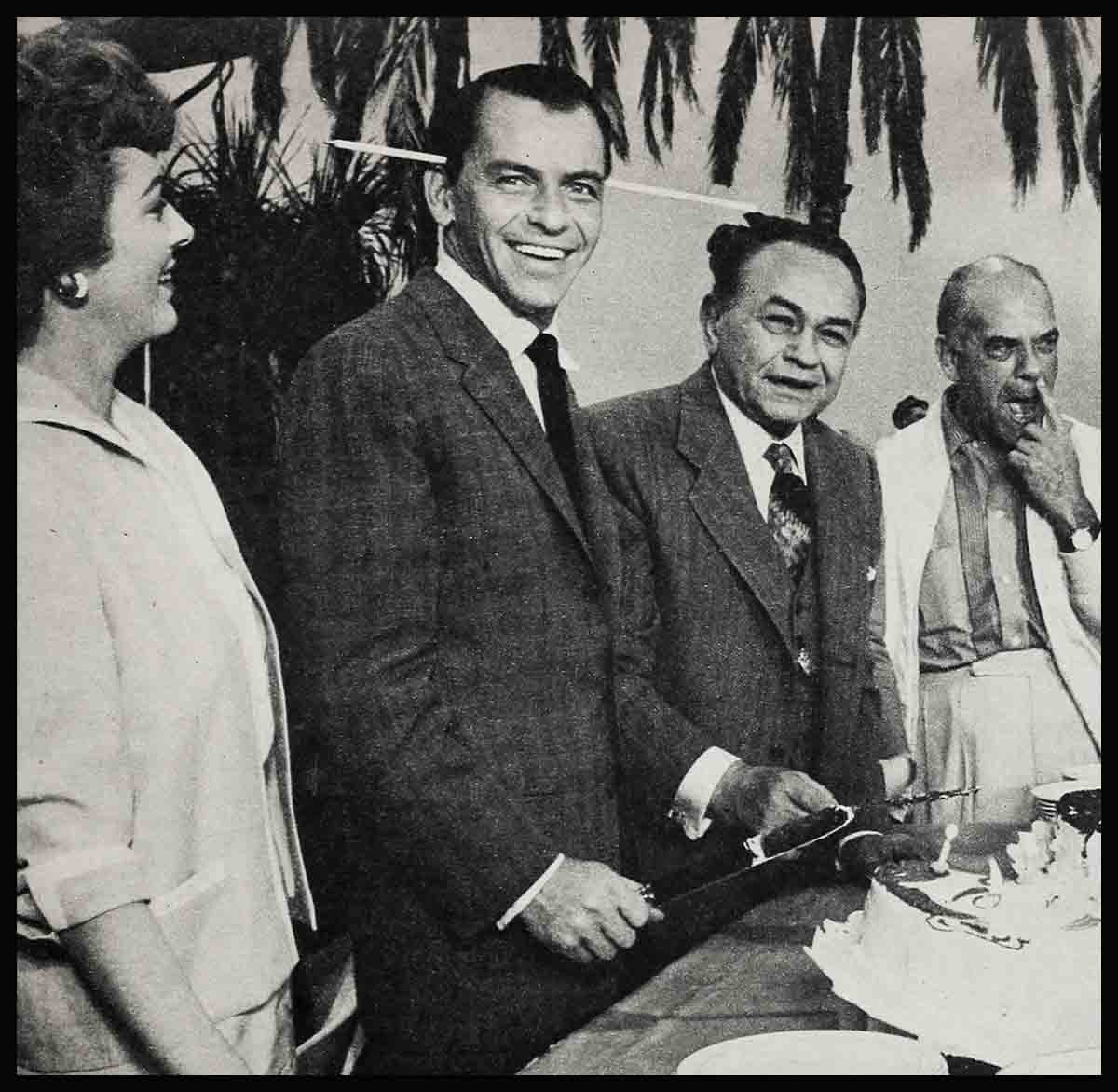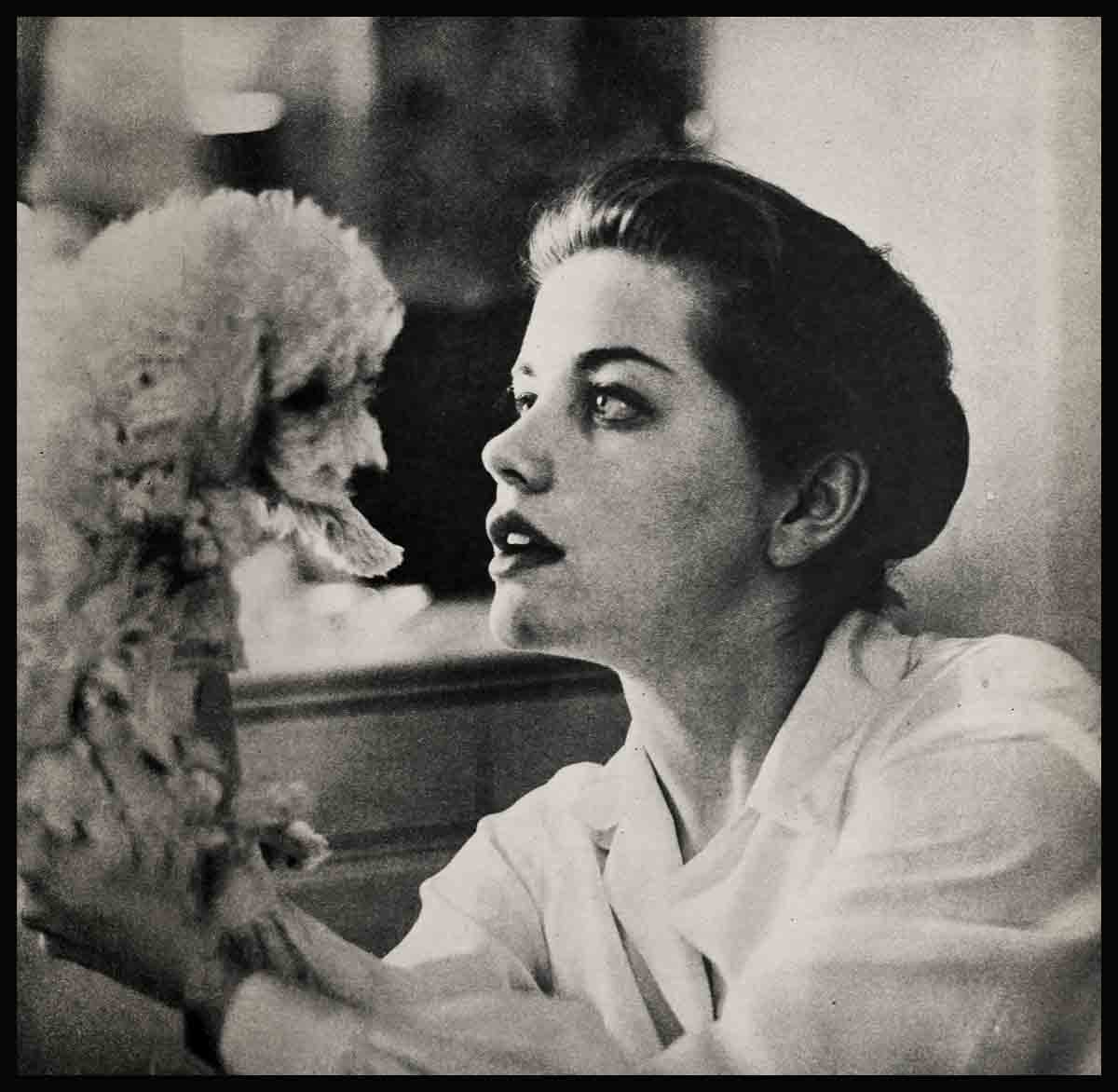
Dinah Shore: “I Hope My Daughter Missy Makes The Same Mistake I did”
“Can you ever get over a broken heart?” asked Dinah Shore, speaking slowly and looking thoughtfully over toward her husband, George Montgomery, as they sat relaxing in the garden of their home. “Missy will be asking me soon and I’ll need an answer for her. Haven’t you noticed how much she’s grown lately? She’ll be having boyfriends before very long and then . . . One day her heart will be broken. It must happen. It happens to every girl. And when the hurt is over, she’ll be glad she had the experience. I know I was. But I also remember how awful it was at the time. So what can I tell her? How can I explain she’s gained, she didn’t lose? How can I explain to her why I hope she makes the mistake I did?”
Dinah was silent a moment and then continued, “Everytime you think you love somebody, you feel enriched. But when he doesn’t love back, it hurts. I know now that every bitter experience makes the sweet one so much sweeter, but do you think a girl who cries herself to sleep at night can believe it?”
It’s an old story. The phone that rings every day for a while, and then doesn’t ring any more . . . the letters from military academy or Scout camp or college that arrive with less and less frequency, and then stop coming entirely . . . the boy who used to wait after school, every afternoon, to walk you part of the way home and then passes with an indifferent nod . . . the girl who dreads every new morning and each new, lonely night more and more, because these things have happened. The story’s familiar to Dinah Shore. It’s been her story more than once, and now she says she’s glad it was, because each time she learned a new lesson in love that helped her, finally, to choose the right man to be her husband—that helped her to be happy.
For Dinah, young love—first heartaches began in the tall, gray building that was Hume Fogg High School, across the street from the Customs House, in Nashville, Tennessee.
“Come on, Dinah,” the girl at the next locker said, “who do you like? You’re bound to like somebody. I know you do.”
Rummaging in the recesses of her locker, the girl took out a cellophane bag.
“Here,” she said, hospitably holding it out, “have a dried apricot. They’re good. And you might as well tell me who you like.”
Dinah hung up her raincoat and reached for her Latin book.
“No, thanks. I don’t want any apricots,” she said. “And as for who I like—I like lots of boys, nobody special.”
“I’ll bet you do, too,” her neighbor insisted. “I’ll tell you who I like if you tell me who you like.”
Just then the bell rang and their chatter was drowned in the hurrying down the hall.
“I’ve got to rush,” Dinah shouted. late for Latin class now.”
Yet, as she said the words, her heart began to churn. She gulped and breathed deeply. Who would believe going to Latin class could be so exciting? she asked herself. But who could believe there was a boy in the world like Alec? It would be impossible to tell anybody what he was like—not that she’d try. And would she ever have dared believe, last semester, that he’d like her better than any other girl in school? Or, at least, that’s what he’d said.
Panting a little, she ran up the stairs to the second floor. She wanted to get to Latin class before Alec took his seat.
When she got upstairs, she noticed he was standing in the door. She’d recognized his silhouette long before she was near enough for his features to come clearly through the dimness of the hall. And she knew, too, when she’d be close enough, he’d smell like wintergreen chewing gum.
“Hey, girl,” he said and winked.
“Hey,” she said. Little chills playing along her backbone.
She wanted to touch him, and yet she didn’t want to. She’d never really felt this way before in her life.
Alec looked at her smilingly, as though he knew what she was thinking. Then he took her by the arm and led her to her desk.
“Are you going to ride the streetcar home today?” he wanted to know. “Because if you do, I will. Suppose I meet you on the corner of Eighth Avenue by the drugstore after school? Okay?”
Smiling, Dinah nodded.
Could this be true? Could it really happening to her? Alec, football star, big man in school, wanted to be with her. Yes, it was true. Happily, she allowed herself the luxury of believing it. The drugstore on the corner, a dowdy, redbrick building, was going to be a little bit of heaven.
All through class, she was conscious of Alec’s presence across the aisle. When he looked at her, her hand shook until she nearly dropped her pencil. His clean, blond good looks had sent more than one girl into a spin.

True to his word, Alec was waiting for her by the drugstore when she got out of school. And she felt so proud as he took her hand and together they passed the other students on the street . . . all noticing, all seeing them together. She knew the other girls were jealous, and had to admit, to herself, that this made their relationship extra special.
“Let me carry your books?”
Carefully, she handed them to him. He was so thoughtful. And when the streetcar came along, he jumped on first, especially to help her up.
Then, when he put his arm around her as they sat down in a double seat, she felt a tingle of excitement. today?” he said.
“Wonderful . . . absolutely wonderful,” she told him.
“What’s so special?”
“Oh . . . just spring,” she lied. “And the thought of an evening without hardly any homework to do.”
“Well, if you’re free and I’m free too, maybe we could take in an early movie?”
“Mother doesn’t usually like me going out during the week. But she likes you . . . and if it’s early, I’m sure she won’t mind.” Dinah tried hard not to let him see how thrilled she was with the invitation.
Yet, it had been one of many such invitations. So many, that soon she began to think of Alec as exclusively hers. He was all she thought about, all she dreamed about and all she believed she was living for. It would be Alec and her forever. . . for always.
But it wasn’t. And he broke it off so cruelly that for a long while she felt lost and hopeless.
Dinah’s agony was to begin shortly after she heard about the luncheon. A club, to which Alec belonged, was entertaining and members were inviting their mothers and their girls. At first, she took it for granted she would be his guest. After all, she was his girl, wasn’t she?
Maybe he didn’t ride home on the streetcar with her quite so often as before. Maybe he was in a hurry after Latin class and didn’t have time to talk, but he was a big man in school. He had other things on his mind besides girls.
But, as the luncheon date approached, and he still didn’t mention it, a sick fear replaced vague uncertainty. Slowly truth overpowered hope, until one day she found out the truth.
“I guess that girl Jill Peabody really has Alec going?” Dinah’s friend at the next confided. “She’s kinda cute, too. I saw them last night at Hillsboro Pharmacy. And my brother said that Alec’s taking her to the luncheon.”
Locker doors all around were banging as students grabbed books for first period class. Blindly, Dinah reached for hers, but her hands felt stiff and icey.
She wondered whether she looked different to the other girls. Did her expression give her away?
Being honest with herself, she admitted she’d known something like this was going to happen. But she’d almost convinced herself that it wasn’t so.
“Well,” she said with effort, “that’s interesting. But I’ve got to hurry to Latin class.”
And blinking back tears, she marched down the hall.
When she reached the room, Alec was already at his desk looking out toward the window. She walked over to him.
“Hello, Alec,” she made herself say. This was hard—speaking to him naturally—but she had to be sure, right now, that she could do it. She couldn’t let him see she knew about the luncheon—or cared.
“Oh, hello,” he answered.
In her heart, she wanted to scream at him, ask him why, why had he done this thing to her, but she didn’t. She couldn’t.
The worst was still ahead. It came after dinner, that night, while Dinah was pinning up her hair. Her mouth was full of pins when the telephone shrilled.
“Dinah dear,” her mother called, phone’s for you. I think it’s Alec.”
Dinah dropped the pins on the dresser and scrambled for the phone. Her head was swimming. So everything was all right after all. The other girl must be a family friend. and he was calling to explain. Had he behaved so strangely, lately, because he was afraid she wouldn’t understand? He should have known her better.
Shakily, she lifted the receiver and leaned her head against the wall for support.
“Is that you, Alec?” she whispered.
“Yep. I called because I think it’s best for you to understand right now that everything’s off between us. I don’t think we really had anything in common. So I guess we won’t see each other again—except in class, of course.”
For a minute, Dinah couldn’t say a word, then, speaking carefully, she told him, “That’s all right. I was going to say the same thing next time we had a chance to talk. I felt that way, too.”
It took a long time to get over that,” Dinah remembers. “I was hurt, terribly hurt, and I felt like crawling into a shell and staying there forever. But I didn’t . . . and I’m glad I didn’t. Because in a few weeks I’d met someone else I liked and, oddly enough, had far more in common with. Sometimes. a broken heart is mostly just broken pride. But it took a painful experience before I learned this.
“I was about fifteen when I broke up with Alec and for weeks I couldn’t eat or sleep. My family pretended not to notice what was wrong with me, but they worried.
“Actually, though, it turned out to be just one of a string of unrequited loves. Always, it seemed, if I liked somebody a lot, he didn’t like me. Or, if he liked me for a while, he’d soon drop me. Eventually, I found out the end of a romance isn’t the end of the world. Either the one I wanted would come back, or I’d meet somebody else I liked better.
“Every time I fell in love,” Dinah continued, “while I was growing up, the boys somehow seemed to lack something.” But, she says, today, when she met George, he was all the things she’d wanted rolled into one. And, when she found out he loved her, too, it was wonderful beyond anything she’d ever imagined.
“That’s why I believe unhappy teenage romances are so important. They give you experience so you can recognize and appreciate the real love of your life.
“Missy’s only twelve. but she’s already interested in boys. And she’s so pretty, I know they’ll be interested in her. I wasn’t pretty. That didn’t bother me though, because I was busy cheerleading and acting with the dramatic club. But I worry about Missy. Her opportunities to fall in love with the wrong boys will be so much greater than mine.
“If only,” Dinah says, “a young girl is careful not to let a broken heart make her cynical, she’ll gain something valuable every time she loves.
“But she must be careful. A girl’s heart is too precious to be squandered carelessly.
“I want Missy to be in love, or to think she’s in love, more than once. Every experience becomes part of the fabric that’s a personality. The love you give without return can be a big, ugly, burnt hole in the blanket, or beautiful trimming. It depends on how you let it affect you.
“Each time I fell in love, I believe I learned a little more about living. Such as what it’s like to be a guitarist (from a guitar player), or something of political science (from a studious boy I used to worship) and how to swim (from a boy who was an Olympic swimmer)!
“But seriously,” she finished, “I want Missy to get hurt so that she can go on to realize that there are many boys in the world to meet and like. And by doing so, I think she will learn, as I did, to recognize the right man when he comes along. By the time I met George, I could tell he was special because I had so many others to compare him to. I was able to appreciate his qualities for all that they are. Yes, I hope Missy makes the mistake I did.”
—ARLENE JOHNSON
DON’T MISS “THE DINAH SHORE CHEVY SHOW” SUNDAYS FROM 9:00-10:00 P.M. EST, OVER NBC-TV. HEAR HER SING ON CAPITOL LABEL.
It is a quote. PHOTOPLAY MAGAZINE APRIL 1960





No Comments